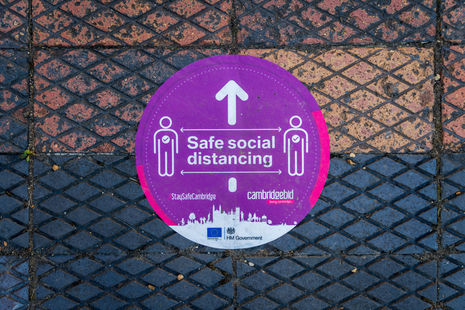Independent SAGE and UCU recommend online teaching as ‘default option’
As Cambridge University prepares to reopen, a new report from Independent SAGE recommends “all University courses should be offered remotely and online, unless they involve practical training or lab work”

Online learning should be the “default option” for universities, according to the Independent SAGE group (iSAGE) in their latest report, released on 21st August.
Yesterday, UCU – the trade union representing over 120,000 university workers – backed iSAGE’s report and accused the government of “encouraging a public health crisis”. They also warned that British universities are just “weeks away” from “sleepwalking into a disaster”.
iSAGE is made up of 13 independent scientists (including two connected to Cambridge) who advise the government and public on minimising health risk in the pandemic. They recommend that “all University courses should be offered remotely and online, unless they involve practical training or lab work” in order to “protect the safety of students, staff and prevent community infections”.
The University of Cambridge, in line with 97% of higher education institutions in the UK, will be providing in-person teaching from Michaelmas, despite iSAGE’s advice that the online delivery of teaching “should be the norm rather than the exception”. The report quotes a recent NUS survey that found a third of students are worried about their safety returning to higher education.
Using two case studies of US universities, the report highlights the “tangible risks” of reopening universities in the UK. Both The University of North Carolina and University of Notre Dame suspended on-campus teaching soon after the start of the academic year in August due to COVID outbreaks.
If universities do not follow iSAGE’s advice to suspend face-to-face teaching, the report offers six recommendations for universities to provide a “Covid-safe university”. The first recommendation suggests the testing of students and staff on or before their arrival on campus.
The University’s current guidance – as part of the Stay Safe Cambridge Uni campaign – is for staff and students to get tests “if you have any COVID-19 symptoms”. The University is not currently offering tests for students and staff as they arrive on campus or periodically throughout the term.
The iSAGE report stresses how important regular testing is for young people, as under 25-year-olds are “more likely to be asymptomatic carriers” and thus more likely to carry and pass on the virus “undetected”.
The report also recommends “Mitigation in classrooms including masks, social distancing of two meters as the norm and regular cleaning”. Current Cambridge guidance says that wearing a face covering will only be necessary in University buildings “where it is not possible to maintain social distancing of at least two metres”. It is suggested that, in supervision rooms where staff and students are two meters apart, there will be no requirement to wear a mask.
The University hasn’t yet released any policy or information on risk assessments or the regular cleaning of supervision rooms, but it is expected that colleges and departments will be providing their own regulations.
Recommendations for an “online welcome week”, reducing social interactions, “residential bubbles”, an “agreement of Covid-safe behaviour on campus”, and “full consultation with University staff” are details that also “may vary between Colleges” and departments.
When contacted for comment, Cambridge Students’ Union (SU) stated that “it is worrying that there is no clear protocol on the cleaning of supervision rooms, particularly on how staff will be trained or paid to fulfill these new duties.
“It makes it much harder for students and staff to feel safe returning to work and study when each college and department may be taking differing approaches to these all-important provisions”.
The SU emphasised, “We would expect colleges and departments to provide an opt-in system for face-to-face contact hours so no student or staff member feels uncomfortable returning to in-person teaching and working”.
Beyond the iSAGE report’s key recommendations is the frequent suggestion that an “overarching strategy” is key to the University’s messaging. The report defines this as messaging which “avoids conflicting messages” and “runs consistently through the different modalities” with a “clear accountability structure”.
In response to questions from Varsity regarding the differences between the University’s current plans and the recommendations of iSAGE, a University spokesperson provided a link to the Stay Safe Cambridge Uni campaign. They noted it “begins with a message from the Vice-Chancellor and provides information to students and staff on how we will all protect ourselves and each other at Cambridge”.
The SU commented that “it is clear that the Collegiate University will be providing vastly different messages to staff and students depending on their department and college with no centralised procedures.
“We have been pushing for a more cohesive narrative and feel strongly that a more joined-up approach will greatly benefit all staff and students”.
 News / Judge Business School advisor resigns over Epstein and Andrew links18 February 2026
News / Judge Business School advisor resigns over Epstein and Andrew links18 February 2026 News / Gov grants £36m to Cambridge supercomputer17 February 2026
News / Gov grants £36m to Cambridge supercomputer17 February 2026 News / CUCA members attend Reform rally in London20 February 2026
News / CUCA members attend Reform rally in London20 February 2026 News / Union speakers condemn ‘hateful’ Katie Hopkins speech14 February 2026
News / Union speakers condemn ‘hateful’ Katie Hopkins speech14 February 2026 News / Hundreds of Cambridge academics demand vote on fate of vet course20 February 2026
News / Hundreds of Cambridge academics demand vote on fate of vet course20 February 2026










